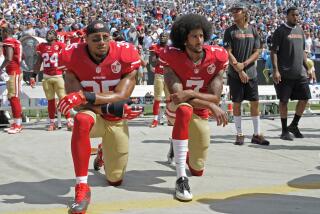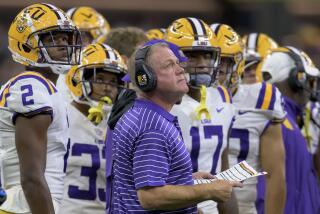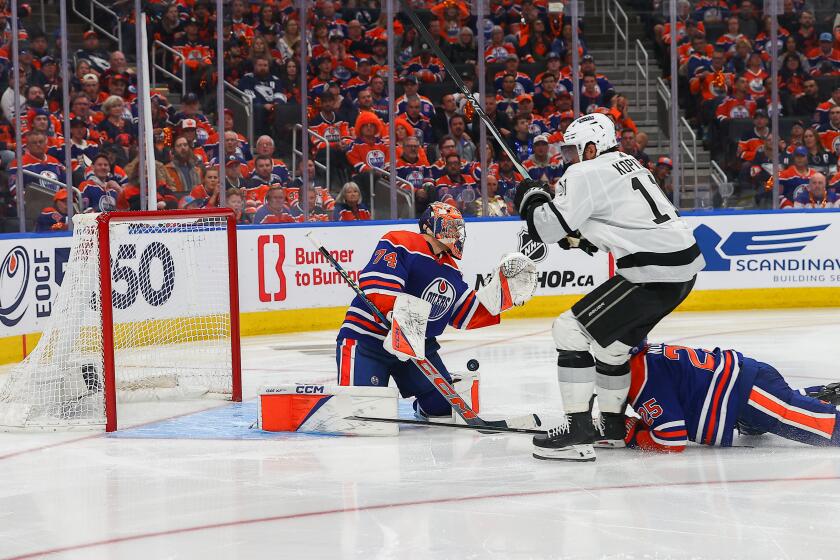Column: NFL anthem decision is about business. The end result may be bad for the bottom line
Economic concerns explain the NFL’s new national anthem policy. They don’t justify them. Business is not a religion and shouldn’t excuse behavior that would otherwise be considered sociopathic.
The NFL exploded in popularity and profitability at a time when most of its players were African American. You would think this alone would make franchise owners sensitive to civil rights issues and want to help the community that produced the majority of its workforce. But rather than engage players who helped enrich them, the owners unilaterally decided to ban a form of protest that has effectively maintained a national conversation about racial injustice. Players will now be required to stand if they are on the field when the national anthem is played.
Some NFL players might be millionaires, but they share something with many Americans who work for large companies. Their employers don’t respect them or what matters to them.
That’s business, I guess.
NFL players are on less stable footing than their counterparts in other sports leagues, particularly because of the high risk of injury and relative scarcity of fully guaranteed salaries. This isn’t the NBA, where the best players are empowered by how they can single-handedly alter the trajectory of a team. It’s shouldn’t be a surprise the NBA is the most socially progressive of the major American sports leagues.
By exploiting this dynamic, NFL owners are playing a dangerous game. The blatant lack of respect they have shown their employees could backfire on them in the form of increased player solidarity. Already, the union has promised to challenge any part of the policy they find to be in violation of the collective bargaining agreement. Unwittingly, the owners could be pushing the players into a direction that would threaten the league’s current imbalanced power structure.
And that would be bad for business.
::
Matt Kemp’s return to the Dodgers has been worthy of a celebration, as the veteran outfielder is batting .338 with six home runs and 25 runs batted in. It’s not entirely inconceivable the 33-year-old Kemp makes the All-Star team, a distinction he last had in 2012.
“That isn’t anything I’ve been really worried about at this moment,” Kemp said. “Those types of accolades are always good, but, right now, I’m just worried about us playing better baseball, being back in first place and staying there.”
If the All-Star game were tomorrow, catcher Yasmani Grandal would probably be the only Dodgers position player representing the National League. But the fact Kemp is even a contender for a spot on an All-Star team speaks to how he has already defied expectations. He was acquired from the Atlanta Braves over the winter not to anchor the Dodgers’ lineup, but to help get the payroll under the luxury-tax threshold. The team was expecting to trade or release him before the start of the season, but he forced his way on to the opening-day roster with a strong exhibition season. He has since earned a regular place in the middle of the Dodgers’ order.
Kemp has proved especially valuable for a team that has problems with situation hitting, as he went into Friday batting .471 with runners in scoring position.
::
New York Yankees rookie Gleyber Torres on Friday became the youngest player in American League history to hit home runs in four straight games, a sobering reminder of the chances a franchise has to take in order to win a World Series.
Torres, 21, was the centerpiece of a three-player package the Chicago Cubs sent to the Yankees in exchange for closer Aroldis Chapman in the days leading up to the 2016 nonwaiver trade deadline. The Cubs knew what they were giving up, as Torres was the top-ranked prospect in their farm system.
The Cubs went on to win the World Series, but barely, their Game 7 triumph over the Cleveland Indians marking the difference between the trade being a smart move and a reckless gamble.
::
The final of the European Champions League will be played Saturday, with Cristiano Ronaldo in position to win the competition for the fifth time, including the fourth with Real Madrid.
Ronaldo is now 33, his longevity a testament to his underappreciated adaptability. There were several points over the last several years when Ronaldo looked as if he was in decline, but he offset the effects of his diminished speed by transforming himself into the world’s most dangerous penalty box player. This is no small achievement, considering Ronaldo played the majority of his career as a winger. His old position required him to run with the ball at his feet; his new one forces him to move without it.
Follow Dylan Hernandez on Twitter @dylanohernandez
More to Read
Get our high school sports newsletter
Prep Rally is devoted to the SoCal high school sports experience, bringing you scores, stories and a behind-the-scenes look at what makes prep sports so popular.
You may occasionally receive promotional content from the Los Angeles Times.







